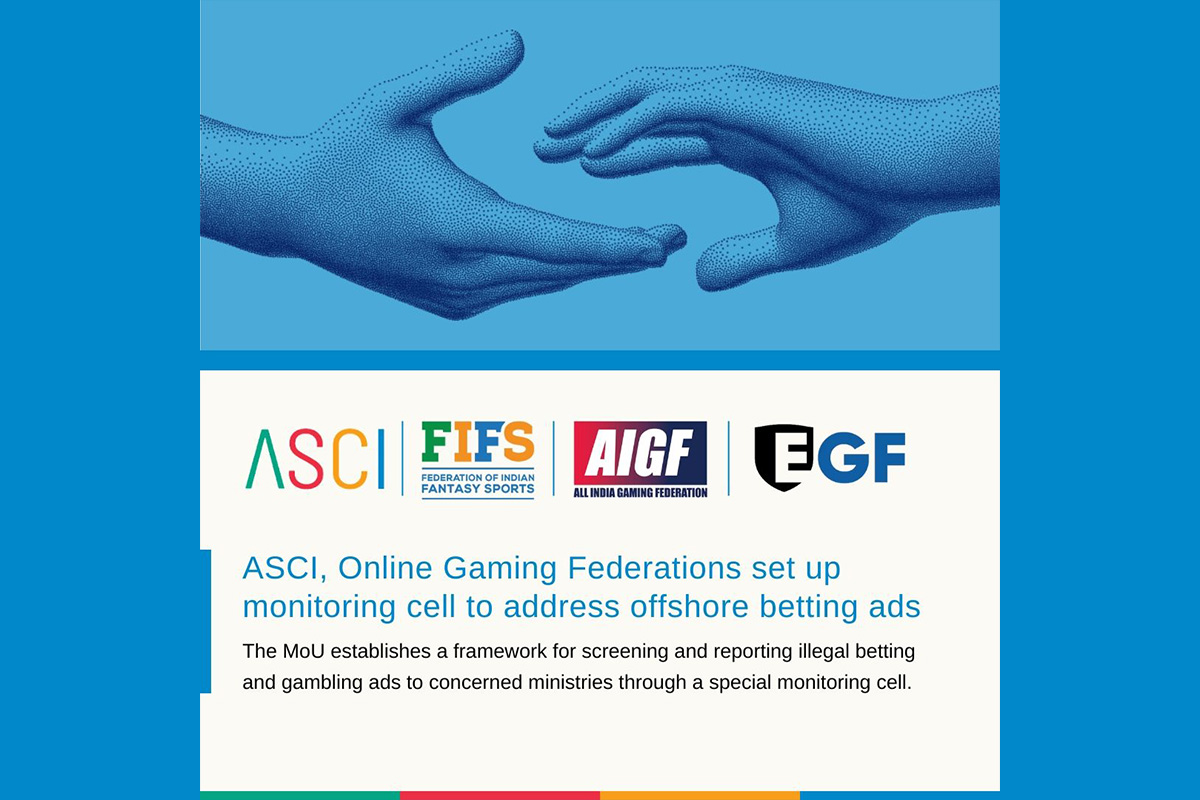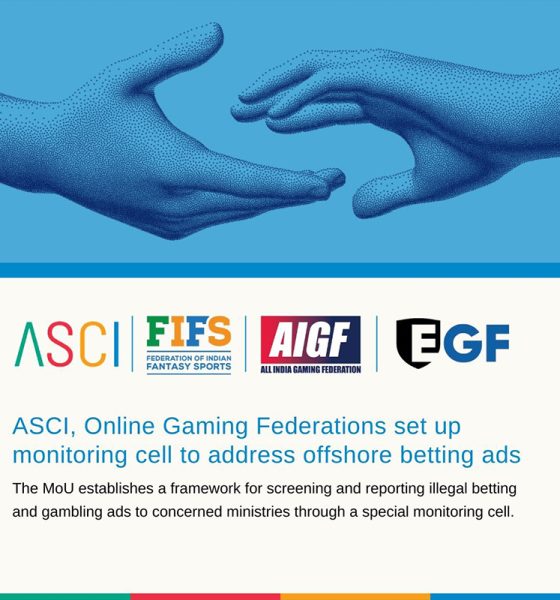

Asia
ASCI Signs MoU with FIFS, AIGF and EGF
The Advertising Standards Council of India (ASCI) has signed a Memorandum of Understanding (MoU) with the Federation of Indian Fantasy Sports (FIFS), the All India Gaming Federation (AIGF) and the E-Gaming Federation (EGF).
The MoU between ASCI and the online gaming industry federations establishes a framework to address these challenges through a special monitoring cell that will focus on screening and reporting offshore betting and gambling advertisements to the concerned ministries. The cell will also screen and process real-money gaming advertisements that are found to be in potential violation of the ASCI Code. The partnership aims to surface illegal ads and also strengthen compliance of the RMG industry.
Since the kickoff of the MoU in January 2025, ASCI has flagged 413 ads of offshore betting to the Ministry of Information and Broadcasting and processed 12 advertisements for potential violation of ASCI’s RMG guidelines. Previously, ASCI flagged off 1336 ads in the period April 2023–March 24, to the Ministry of I&B. Based on this, the Ministry has taken action to block such ads and platforms. During the same period, 492 cases pertaining to Real Money Gaming were also taken up by ASCI.
Indian state laws prohibit gambling and offshore betting activities; making advertisements for these activities, illegal in these states. However, online real-money games (RMG) that require a predominance of skill, are permitted by most state laws, and their advertising is therefore allowed. Some offshore betting and gambling operators attempt to portray themselves as legally permitted gaming companies, necessitating the need to identify such advertisements and escalate the same to regulators. For the real-money gaming sector, ASCI’s guidelines for “Advertising of Online Gaming for Real Money Winnings” needs advertisements to ensure that the content of such ads remains responsible and does not depict minors or represents winnings as a means of livelihood. In addition, these ads are required to carry disclaimers to inform consumers of the risks associated with such games.
Manisha Kapoor, CEO and Secretary General of ASCI, said: “Indian consumers are exposed to numerous ads of offshore betting and gambling companies that have no accountability in India. Several Indian celebrities too have been a part of such advertisements. Since gambling ads are prohibited in most parts of the country, their large-scale presence is a breach of the law. ASCI would like to surface such advertising to the regulators for necessary action. It is also key that the gaming industry, whose advertising is permissible in India, remains compliant with the ASCI Code. We welcome the proactive initiative of the gaming associations of working with the self-regulator to create a special monitoring cell for the industry.”
Neil Castelino, CEO of Federation of Indian Fantasy Sports, said: “Members of FIFS have demonstrated their commitment and compliance to responsible advertising through implementation of the ASCI guidelines and FIFS Charter. We are further committed to adopting the global best standards in responsible advertising, and through this collaboration, we hope that Indian consumers are not exposed to illegal platforms in the guise of online gaming while promoting responsible advertising practices amongst the Indian RMG industry.”
Anuraag Saxena, CEO of E-Gaming Federation, said: “Indian citizens have been duped and scammed by unscrupulous operators for years. The nation suffers, so do consumers, so does the domestic industry. Which is why we at EGF have been pioneering responsible gaming, and mandatory audits of our gaming companies. The monitoring cell of ASCI will only turbo-boost our efforts. Together, we will uphold high ethical standards and create a safer, more trusted gaming landscape for all.”
Roland Landers, CEO of All India Gaming Federations, said: “As the oldest and largest industry federation, AIGF has been at the forefront of advocating for responsible gaming practices and addressing the menace of offshore and illegal betting and gambling. We remain steadfast in our mission to ensure a robust, transparent, and responsible gaming environment in India. By collaborating with ASCI and fellow industry federations, we aim to tackle the growing challenge of offshore gambling ads and non-compliant advertising practices. This MoU marks a pivotal step towards protecting consumers, fostering ethical advertising, and elevating the credibility of India’s online gaming sector. Together, we are dedicated to shaping a fair and sustainable ecosystem for all stakeholders.”
The post ASCI Signs MoU with FIFS, AIGF and EGF appeared first on European Gaming Industry News.
Asia
Digital gaming disruption tackled in 1st AsPac Regulators’ Forum

Regulators from across the Asia-Pacific region underscored the need to adapt to digital disruption in the gaming industry during the first-ever Regulators’ Forum held in Manila on Thursday, September 11.
In her keynote address, Philippine Amusement and Gaming Corporation (PAGCOR) President and COO Wilma Eisma said that while gaming jurisdictions across the region vary in size and maturity, they share common challenges such as cross-border transactions, rapid digitalization, and balancing economic benefits with social responsibility.
“In the Philippines, electronic gaming has become a significant growth driver and PAGCOR has responded with initiatives that ensure accountability, security, and consumer protection while allowing the industry to thrive responsibly,” Ms. Eisma said.
However, she said that digitalization, remote gaming, and emerging platforms are testing the limits of traditional oversight models.
“By exchanging best practices, aligning responsible standards, and keeping pace with innovation, we can ensure that the region’s gaming industry grows not just in size but in trust, resilience, and sustainability,” she said.
Ms. Eisma said PAGCOR has introduced reforms such as stricter advertising rules, stronger financial safeguards, and expanded responsible gaming programs but noted that the greater challenge lies in keeping pace with the rapid evolution of online and remote gaming.
The PAGCOR executive also expressed hope that the Regulators’ Forum will become an annual platform for dialogue, with an expanded edition already being planned for 2026.
“I am confident that this Regulators’ Forum will evolve into a hub for knowledge, collaboration and shared commitment,” she said. “Together, let us set the tone for gaming regulation in Asia: one that is innovative, collaborative and firmly anchored on integrity.”
The event was organized by PAGCOR and Inside Asian Gaming (IAG) and hosted by Newport World Resorts. It gathered regulators, operators, and stakeholders from across the region to tackle concerns on player protection and financial integrity, among others.
The post Digital gaming disruption tackled in 1st AsPac Regulators’ Forum appeared first on European Gaming Industry News.
Asia
Galaxy Entertainment Opens New Overseas Office in Singapore

Galaxy Entertainment Group (GEG) has opened a new overseas office in Singapore. This strategic initiative marks a new chapter in GEG’s growth trajectory and underscores its commitment to promoting Macau as the “World Centre of Tourism and Leisure” to a broader audience across Southeast Asia.
Singapore, one of Asia’s most vibrant and cosmopolitan countries, has long been a key source market for Macau. The new office, located in the heart of Singapore’s Central Business District, will serve as a dedicated hub to enhance connections with the Singaporean business community, as well as showcasing to Singapore and the broader Southeast Asian Region Macau’s dynamic evolving tourism landscape-highlighting its rich cultural heritage, luxury hospitality and increasingly diverse world-class leisure and entertainment experience offering.
The opening of Galaxy’s Lion City office is closely aligned with the Macao SAR Government’s vision to diversify tourism offerings and expand visitor demographics. Through its ramped-up Singapore presence, GEG aims to curate bespoke travel experiences tailored to the preferences of Singaporean and regional travelers, ensuring seamless journeys from planning to arrival.
GEG’s new office will support tourism, meetings, incentives, conferences and exhibitions (MICE) inquiries, reinforcing its role as a versatile hospitality leader and a trusted partner for business tourism.
In addition, GEG’s Singapore office reflects the Group’s forward-thinking approach to innovation, customer-centricity and regional collaboration. It also signals GEG’s intent to enhance brand visibility and foster meaningful connections with travelers and stakeholders across Asia.
To celebrate the grand opening, GEG hosted an elegant gala dinner at JW Marriott Singapore, welcoming distinguished guests, business partners and media representatives. Mr. Elmen Lee, Director of Integrated Resort Services at GEG, introduced to the guests the Group’s three flagship properties in Macau-Galaxy Macau and Galaxy International Convention Center, Broadway Macau and StarWorld Hotel.
Mr. Lee said: “Singapore has always been an important source market for Macau. The taste and sophistication of Singaporean travelers naturally align with Macau’s experiential tourism offering. We firmly believe that Galaxy Entertainment Group’s diverse offerings will attract more Singaporean visitors to visit us and explore more. In support of the Macao SAR Government’s vision to promote tourism diversification, Galaxy Entertainment Group is continuing to expand its international visitor base to inject more vitality into Macau.”
Galaxy Macau, Broadway Macau and StarWorld Hotel bring together luxurious accommodations, award-winning dining, premium shopping and world-class entertainment facilities; each with its own unique character. With Galaxy Macau home to nine of the world’s leading luxury hospitality brands under one roof, catering to the diverse needs of international travelers; the Galaxy trio collectively showcases the excellence of Macau’s hospitality industry.
The post Galaxy Entertainment Opens New Overseas Office in Singapore appeared first on European Gaming Industry News.
Asia
Kazakhstan Considers Criminal Penalties for Promoting Online Casinos

Kazakhstan’s Financial Monitoring Agency (FMA) has identified 34 bloggers promoting online casinos on social media, with 11 already facing administrative penalties. The agency has stated that fines alone are not deterring repeat offenders and is now considering introducing criminal liability for such activities.
A law passed in 2024 strictly prohibits outdoor advertising for bookmakers, online casinos and betting pools, as well as their promotion in media, films and video content. According to the FMA, over the past two and a half years, more than 200 illegal gambling operations have been dismantled, and 224 individuals have been held criminally accountable. However, the agency notes that the primary threat now stems from online casinos based abroad.
Since the beginning of this year, authorities have blocked more than 17,000 links, mostly mirror sites for foreign platforms. Despite these efforts, some Kazakhstani payment service providers continue to facilitate transactions linked to such websites. The FMA has pledged to intensify investigations into these financial intermediaries.
Influencer marketing remains a key channel for online gambling promotion. In the first half of the year alone, 34 influencers were identified as advertising gambling services, with 11 fined. But according to the FMA, revenues from such promotions far exceed the cost of the fines, creating incentives for repeated violations.
In response, the agency is exploring whether bloggers’ actions could be legally interpreted as aiding and abetting illegal gambling, a charge similar to promoting financial pyramid schemes, which already carries criminal penalties under Kazakhstani law. Currently, fines for illegal advertising on social media start at 200,000 KZT (approximately $420).
The post Kazakhstan Considers Criminal Penalties for Promoting Online Casinos appeared first on European Gaming Industry News.
-

 gaming3 years ago
gaming3 years agoODIN by 4Players: Immersive, state-of-the-art in-game audio launches into the next generation of gaming
-
EEG iGaming Directory9 years ago
iSoftBet continues to grow with new release Forest Mania
-
News8 years ago
Softbroke collaborates with Asia Live Tech for the expansion of the service line in the igaming market
-
News7 years ago
Super Bowl LIII: NFL Fans Can Bet on the #1 Sportsbook Review Site Betting-Super-Bowl.com, Providing Free Unbiased and Trusted News, Picks and Predictions
-
iGaming Industry8 years ago
Rick Meitzler appointed to the Indian Gaming Magazine Advisory Board for 2018
-
News7 years ago
REVEALED: Top eSports players set to earn $3.2 million in 2019
-
iGaming Industry8 years ago
French Senator raises Loot Boxes to France’s Gambling Regulator
-
News7 years ago
Exclusive Interview with Miklos Handa (Founder of the email marketing solutions, “MailMike.net”), speaker at Vienna International Gaming Expo 2018











